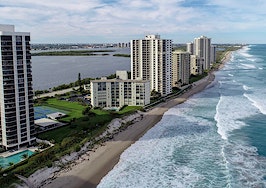While much around the proposed capital gains tax remains up in the air, its potential effect on the country’s wealthiest residents is leading to a slew of questions being thrown at luxury agents and financial advisors.
As a way of funding the $1.8 trillion American Families Plan to help families with young children struggling with poverty, President Joe Biden recently outlined the next steps toward raising income taxes from 37 to 39.6 percent for households making more than $400,000 per year, and increasing the long-term capital gains rate from the current 20 percent cap to 39.6 percent for people who make over $1 million annually.
The capital gains tax would be applied when selling assets such as real estate (and also stocks and shares) that one has held for more than a year — that said, it is causing quite a stir in affluent enclaves like the Hamptons and Malibu.

Noel Roberts
“It’s something that we talk about in every other conversation,” Noel Roberts, the head of the local Nest Seekers’ Private Client boutique practice in the Hamptons and star of Million Dollar Beach House, told Inman. “As late as last year, it became a concern for clients who had a property that they were looking to sell last year. Because it was rumored that Biden would close the 1031 loophole [a section of the IRS tax code that allows investors to swap one property for another and defer the tax], they were extremely motivated to see a sale culminate by the end of the year.”
While places like Southampton and Malibu have average household incomes of below $200,000, these places are also home to a large number of residents who have millions of dollars in assets and multiple properties that they lease out as investments. Marco Rufo, a partner with The Agency in Pacific Palisades, said that clients who will be impacted most in the short-term are those who are looking to trade or unload expensive properties soon.
“In West LA, there are a lot of people making over a million dollars right per year, so their federal taxes are going to up more than 20 percent,” Rufo said. “That’s huge and the conversation that people are having is ‘how am I going to protect myself from that?’ Accountants and financial advisors are already looking for loopholes and, unfortunately, they’re probably going to find them.”
Over the last year, luxury sales have had the opposite effect from what many predicted at the onset of the coronavirus pandemic. While many thought that financial uncertainty would cause a surplus of vacation properties on the market, low mortgage rates and travel restrictions have instead skyrocketed the number of people looking to buy luxurious, amenity-heavy homes in popular vacation destinations. Across the U.S., sales of luxury homes rose 41.6 percent year-over-year in the first quarter of 2021.

Marco Rufo
On a larger scale, both Roberts and Rufo believe that luxury sales will continue to flourish. Moving investment properties around and finding ways to minimize tax impact has always been a strategy of those who live in this type of ultra-luxury world.
But because of the uncertainty around whether the capital gains tax will come into effect or whom it will affect, Roberts said that a number of ultra-high-net-worth clients who have been sitting on properties in the hopes to see prices grow are now motivated to sell in the next few months. Some even did so before the end of 2020 in worries that certain tax changes could become retroactive.
“This is something for [luxury agents] to be thinking about throughout the rest of this year,” Roberts said, bringing up an example of a developer client who traded one ultra-luxury investment property for three commercial properties and is now wondering whether selling it outright and taking a tax hit was the way to go. “I think we’re going to see a spurt of investment activity this year from clients who want to take advantage of the 1031 [exchange] or just sell at the [current] tax rate as opposed to that future rate which is nearly double.”
These types of concerns naturally appear outrageous to people who earn average salaries. As Biden frequently says at press conferences, the proposed tax changes are an attempt to level the playing field and address the kind of extreme inequality that is often observed in the world of luxury real estate compared to the average American.
But the effect of the tax hikes is something that high-earning developers and 1-percent individuals looking to sell in the short term are thinking about seriously. As many look for ways to minimize tax impact, the luxury real estate sphere could see a number of interesting sales and wider after-shock effects in the coming months.
“Biden has been talking about it for a while, but in the last two weeks, it became much more official,” Rufo said. “Now, everyone really has their eyes open.”









